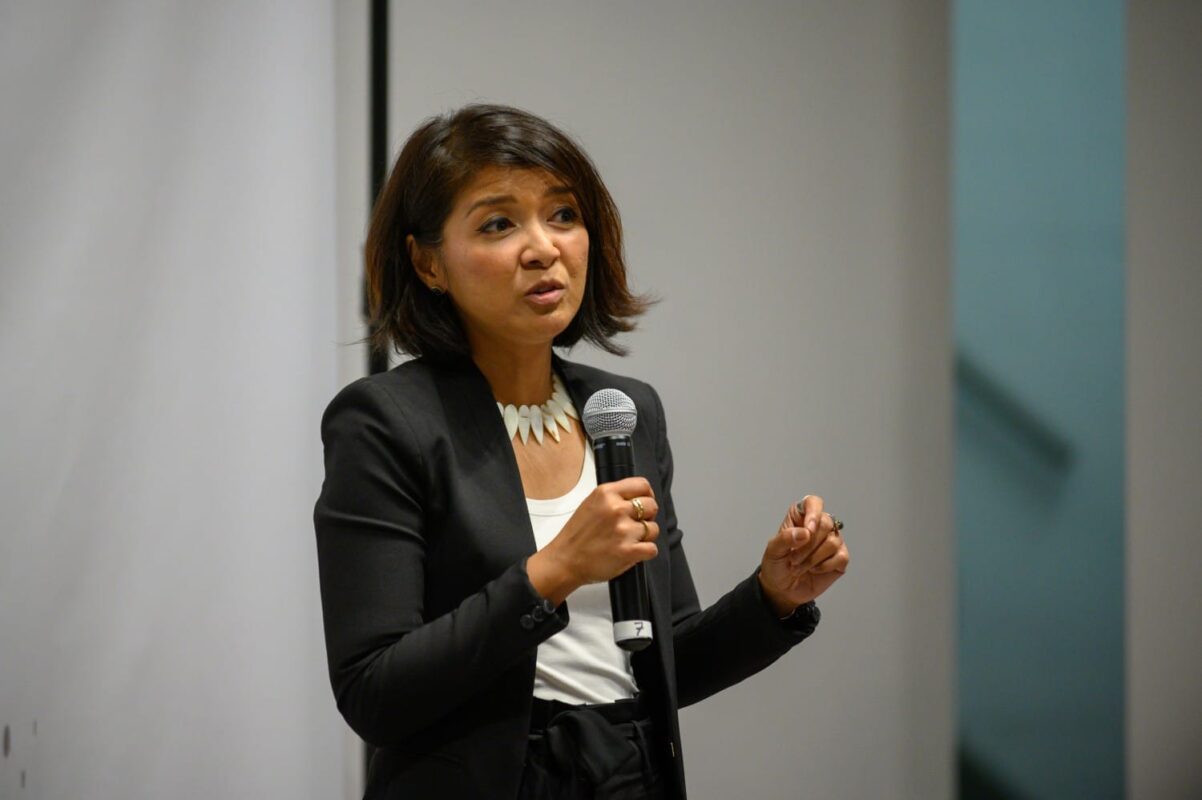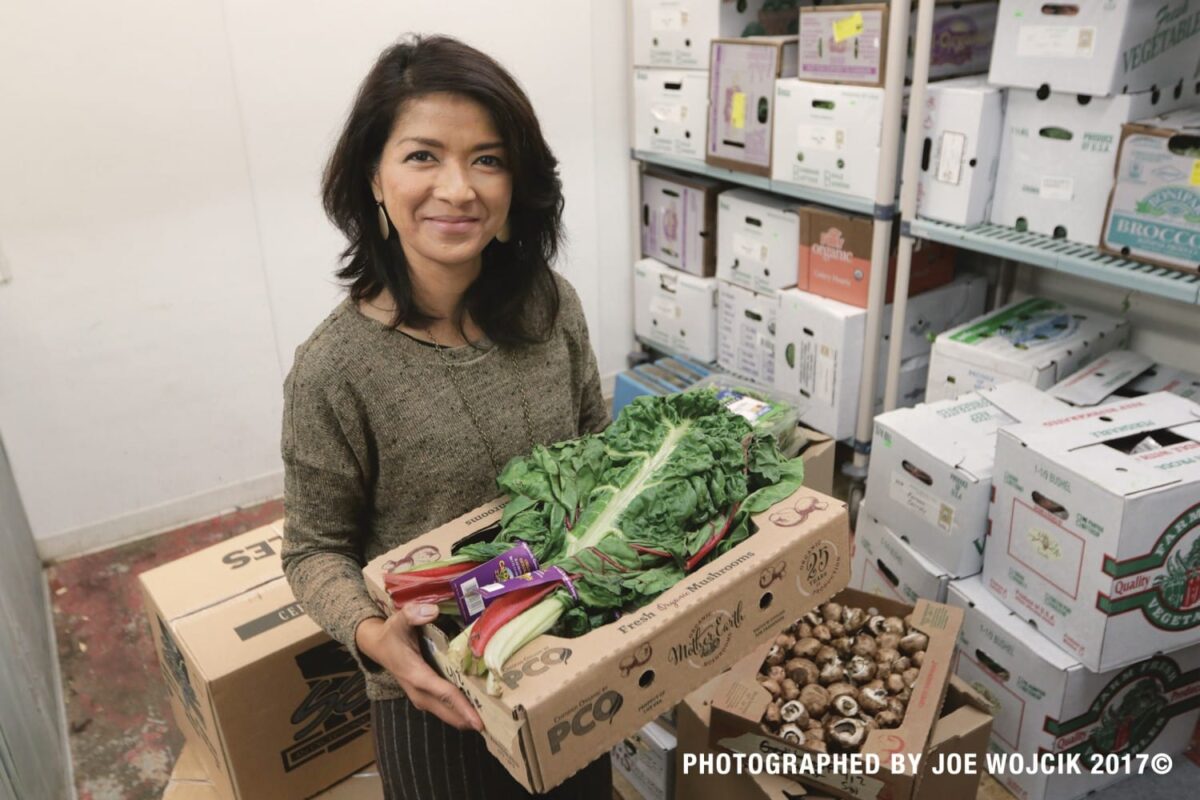WHO ARE YOU?
Leah Lizarondo, Co-Founder and CEO of 412 Food Rescue
WHAT did you do ?
I co-founded and am CEO of 412 Food Rescue – an organization that focuses on solving hunger and climate change by cutting down food waste by creating the largest technology-mobilized volunteer food transport network in the world. 412 Food Rescue’s portfolio of food recovery initiatives ranges from building technology and logistics infrastructure to creating new markets for products that redirect good food from feeding landfills to feeding people. We partner with food retailers, nonprofit organizations, and build a movement of #FoodRescueHeroes to bring healthy food directly to those experiencing food insecurity.
Our food rescue program addresses the disconnect in distribution—in supply and access—by rescuing food about to go to waste and directly distributing to organizations that serve communities in need. We work with food retailers, wholesalers, restaurants, caterers, universities and other food providers to rescue unsellable but perfectly good food. 412 Food Rescue aggregates retail donors and nonprofit beneficiaries, utilizes technology to intelligently match surplus food to the appropriate organizations and mobilize our corps of #foodrescueheroes. We only rescue fresh, perishable food—healthy food—and directly distribute to organizations.
412 Food Rescue’s technology platform, also known as “Food Rescue Hero,” is an end-to-end system that matches food donations to the appropriate nonprofits, coordinates a last-mile transportation network of volunteers, trains volunteers on food safety and tracks data and analytics–measuring impact on hunger and the environment. This platform that was founded in Pittsburgh, now powers food rescue organizations in San Francisco, Los Angeles, Philadelphia, Cleveland, Northern Virginia and Vancouver. Our goal is to serve 100 cities by 2030.
HOW did you do it?
412 Food Rescue merges three things I am passionate about – food, technology and social impact. Before founding 412 Food Rescue, I wrote an award-winning food column for Pittsburgh Magazine. I also trained at the Natural Gourmet Institute in NYC and am certified in Plant-based Nutrition from the T. Colin Campbell Institute at Cornell University. I completed my graduate degree in Public Policy at Heinz College at Carnegie Mellon University – where I focused on technology policy. I currently serve as Entrepreneur-in-Residence at the Block Center for Technology & Society at Carnegie Mellon.
WHEN did you start your company?
We started in 2015. I was always interested in food and food policy but the idea behind 412 Food Rescue was triggered by a report released by the National Resources Defense Council in 2012 titled “Wasted” – it’s the NRDC’s most downloaded report and it raised awareness for the fact that we waste 40% of our food supply. I always knew there was food waste but that much? And we all know that on the other side 1 in 7 Americans are food insecure. We have enough food to feed everyone who is experiencing hunger, four times over. It was an unacceptable disconnect.
WHY are you innovating with this product or service?
I grew up in the Philippines where there is so much need, so much income inequality. When I immigrated to the United States, I thought life would be different. But truly, it is not very different. Poverty, hunger, are everywhere. Maybe more hidden in some places. But it exists. 40 million Americans do not know where their next meal is coming. This was a jarring realization – from someone who idealized life in the U.S. But when I got to New York, what struck me most was the sharp and obvious wealth and lifestyle disparities: the richest of the rich living directly alongside the poorest. The particular irony that struck me was seeing high-end restaurants toss food in the garbage, when people in need of that food stood not 100 feet away. That link to me seemed broken. Plus, I started learning more and more about the disastrous impact that food production and waste has on the environment. We created 412 Food Rescue as a direct response to the disconnect between food waste, hunger and environmental sustainability.
We waste up to 40% of our food globally —translating to over 1.3 billion tons annually. In the United States, we waste 62.5 million tons and spend $218 billion a year (or 1.3% of our GDP) in “growing, processing, transporting, and disposing of food that is never eaten.” In the United States, 1 in 7 are hungry. According to the United Nations, if we recover all the food that is lost or wasted, we will have enough to feed all those who are hungry, four times over. The Food and Agriculture Organization (FAO) estimates that 52% of fruits and vegetables go to waste —food that supplies that highest quality nutrition required to prevent obesity and disease.
Food production uses 10% of the energy budget, 50% of the land and 80% of all fresh water consumed in the U.S. According to the Environmental Protection Agency, over 97% of food waste generated ends up in the landfill. This comprises the single largest component of municipal solid waste —generating a large portion of U.S. methane emissions (a greenhouse gas 21 times more potent than carbon dioxide.) 40% of food going to waste translates to 20 pounds of food per person per month, worth $165 billion a year. We realized that technology, and the goodness of people, could help solve these issues. I know it’s an audacious assumption. Some may even say absurd. How can we depend on people? But it’s working measurably, In the cities that we work in.
Our technology platform links volunteer drivers with the restaurants and grocery stores getting rid of excess food, and they deliver that excess food to the organizations that need it most. In five years, we work in six cities, recovering food from over 2300 locations, donating to 900 charities. Our volunteer drivers have recovered over 10 million pounds of food! Over 10,000 people receive push notifications of food rescue opportunities. We think this model at 412 Food Rescue can expand to have global impact. As I said when presenting during the Vital Voices WE Empower Pitch night: 10 cities today, 100 cities by 2030. We want to mobilize 1 million people to take action – ending food waste, food insecurity and impacting climate change globally.
WHERE are you from?
I’m originally from the Philippines and currently live in Pittsburgh, PA.
INDUSTRY: Nonprofit, Technology and Environment
SOCIAL MEDIA :
- 412 Food rescue
- https://www.instagram.com/412foodrescue/
- https://www.facebook.com/412FoodRescue/
- https://twitter.com/412FoodRescue
- Leah Lizarondo


